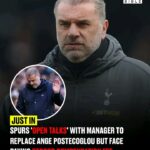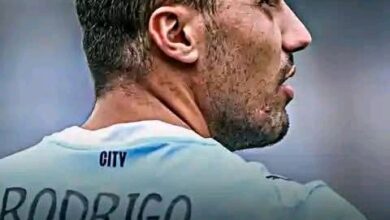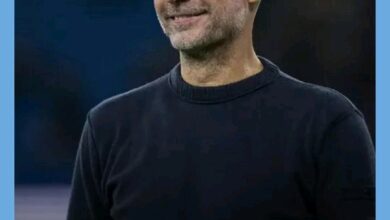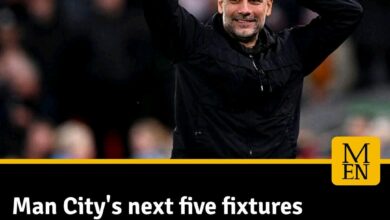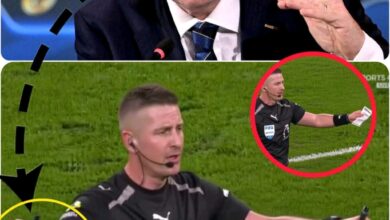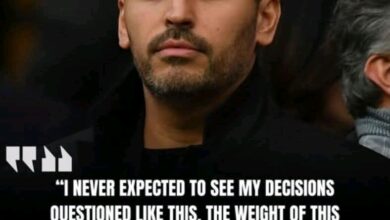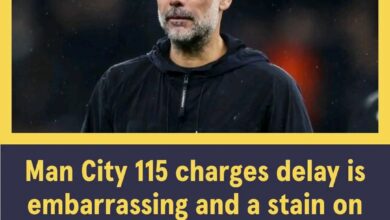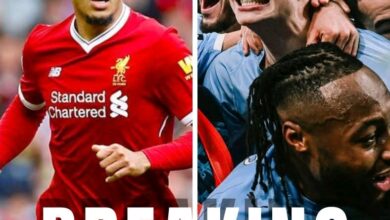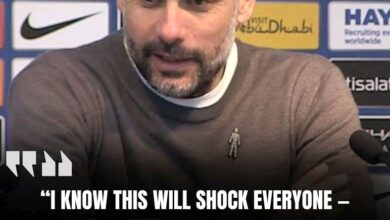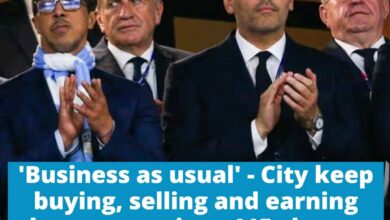Forget Jurgen Klopp: Why Liverpool Must Turn to “World-Class” Oliver Glasner if Arne Slot’s Struggles Continue
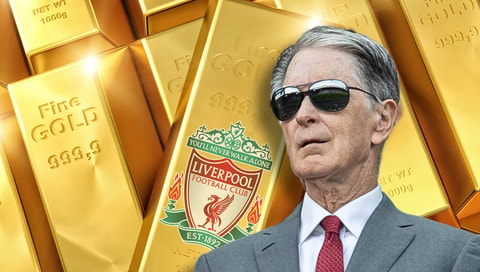
Liverpool’s season has taken a sharp and unexpected turn. The optimism that surrounded Arne Slot’s appointment and the club’s summer of heavy investment has begun to fade, replaced by doubt, frustration, and a growing sense of déjà vu. Seven defeats in ten competitive matches have left the Dutchman under real scrutiny for the first time in his Liverpool tenure.
Just months ago, Slot was celebrated as the architect of Liverpool’s title-winning campaign — a debut season that restored domestic glory to Anfield and suggested the post-Klopp era might not be as painful as many feared. Yet football moves fast. Now, that early promise has been replaced by an alarming slide in form, a squad struggling for rhythm, and supporters questioning whether the man chosen to replace Jurgen Klopp can truly deliver long-term success.
Liverpool’s 3–0 defeat to Manchester City on Sunday was more than just another loss. It was a mirror held up to all the flaws that have developed in recent weeks. The defensive vulnerability, the lack of cohesion in midfield, the predictable attacking patterns — they were all laid bare by Pep Guardiola’s ruthless champions.
City exploited Liverpool’s defensive shape time and again, forcing the Reds into awkward positions and capitalising on their lack of compactness between the lines. Slot’s commitment to a fluid, possession-based system — one that worked beautifully in the early stages of his reign — now seems to be exposing the very weaknesses it was designed to hide.
When Slot’s Liverpool are good, they are breathtaking: fluid, energetic, brave on the ball. When they are bad, they are alarmingly open. Against elite opposition, that difference is decisive. The Etihad defeat wasn’t just about a better team winning; it was about a team whose structure has started to come apart at the seams.
## The Modern Manager’s Dilemma
Slot is now discovering the cut-throat reality of Premier League management at a so-called “big six” club. The patience that Sir Alex Ferguson once enjoyed at Manchester United, or that Klopp was afforded during his early years at Liverpool, barely exists anymore. In today’s hyper-competitive, high-spending environment, time is a luxury few managers get — even the ones who have recently lifted trophies.
The Dutchman’s impressive first campaign bought him goodwill, but not immunity. A £400-million spending spree over the summer heightened expectations to near-unrealistic levels. Fans and pundits alike anticipated that Liverpool would dominate again, seamlessly blending Slot’s tactical ideals with a refreshed, hungry squad.
Instead, the opposite has happened. New signings are still adjusting, key players are out of form, and the team’s identity has become blurred. For all the talk about “the Liverpool way,” this feels more like a team stuck between two worlds — not fully Klopp’s pressing machine, not fully Slot’s positional-play experiment.
## Fenway Sports Group’s Calculated Patience
Liverpool’s American owners, Fenway Sports Group (FSG), are not known for making rash decisions. Their track record shows a preference for stability over short-term fixes. They stood by Brendan Rodgers through the turmoil of the 2014-15 season before eventually acting, and their faith in Jurgen Klopp paid off spectacularly.
However, this Liverpool is different. The investment made this summer marked a significant shift in FSG’s approach. The arrivals of Alexander Isak, Florian Wirtz, Jeremie Frimpong, Hugo Ekitike, and Milos Kerkez represented a clear attempt to future-proof the squad. The ambition was unmistakable. So too were the expectations.
With big spending comes big accountability. Slot was backed like no Liverpool manager before him, and the ownership will expect quick results. The club hierarchy won’t move impulsively, but neither will they allow a season of decline to unravel without intervention.
That’s why, quietly but inevitably, conversations have already begun in footballing circles about potential replacements should this downturn continue. And while the idea of Klopp returning has been floated, it feels far-fetched. Even the man himself admitted in a recent interview that it’s “technically possible” but not truly realistic.
## The Candidates: Zidane, Iraola, Alonso… or Glasner?
When big jobs become uncertain, the usual names circulate. Zinedine Zidane, ever the enigmatic figure, remains unattached and theoretically available. Andoni Iraola’s work at Bournemouth continues to draw admiration. Xabi Alonso, Liverpool legend turned tactical prodigy at Bayer Leverkusen, will always attract attention.
But there is one name that deserves serious consideration — not just because of results, but because of fit. That name is **Oliver Glasner**.
The Austrian tactician has quietly built a reputation as one of Europe’s most intelligent, modern, and adaptable coaches. At Eintracht Frankfurt, he masterminded a Europa League triumph in 2022. At Crystal Palace, he has performed minor miracles, transforming a mid-table squad into one of the league’s most tactically disciplined, unpredictable, and resilient sides.
And crucially, he’s already outclassed Arne Slot — twice this season.
## Glasner’s Blueprint: Structure, Simplicity, Success
Football can often be over-complicated, but Glasner’s philosophy is refreshingly straightforward. His teams are compact, aggressive without the ball, and ruthless on the counter-attack. He values balance above all else — ensuring his players understand their roles within a flexible but clearly defined structure.
When Palace defeated Liverpool 2–1 early in the season, it was not a fluke. Glasner’s setup neutralised Liverpool’s strengths and exposed their weaknesses. Palace pressed selectively, denying space in midfield and exploiting the channels behind the full-backs. Weeks later, when they returned to Anfield in the EFL Cup and won 3–0, it confirmed that the first result was no accident.
Those matches weren’t just losses for Slot; they were lessons. Glasner demonstrated precisely what Liverpool are missing: a tactical identity that combines discipline with dynamism.
Slot’s Liverpool can look thrilling when everything clicks — but they lack Glasner’s consistency, his sense of control. Palace may not have the star names Liverpool do, but they operate like a machine, each part functioning in harmony with the others.
## A Liverpool Squad Built for Glasner’s Methods
What makes Glasner such an intriguing candidate for Liverpool is how naturally his system would suit the players already at the club. His preferred 3-4-2-1 or 3-4-3 shape emphasises wing-back play, disciplined centre-backs, and fluid attacking midfielders — precisely the profile Liverpool’s current roster provides.
If the Reds had managed to sign Crystal Palace captain Marc Guehi — a transfer that came close to completion in August — the fit would be almost perfect. Glasner personally intervened to keep his captain, aware of Guehi’s value both on and off the pitch. But even without him, Liverpool’s back line offers all the ingredients Glasner looks for.
Virgil van Dijk, still an elite organiser, would anchor a three-man defence flanked by Ibrahima Konaté and a ball-playing option such as Guehi or Joe Gomez. Out wide, Milos Kerkez and Jeremie Frimpong could replicate the relentless running and verticality that Tyrick Mitchell and Daniel Muñoz provide for Palace.
In midfield, the work rate and intelligence of Dominik Szoboszlai and Ryan Gravenberch would offer Glasner the engine room his system demands. Both players are capable of covering ground, pressing aggressively, and transitioning quickly. Ahead of them, Florian Wirtz could operate in a free-floating creative role — similar to how Eberechi Eze functions for Palace, drifting centrally to link play and unbalance defences.
And in attack, the combination of Alexander Isak and Mohamed Salah would be devastating. Glasner’s emphasis on quick vertical movements and structured rotations would give Salah the freedom he thrives on, while allowing Isak to play as a more traditional forward who can both link and finish.
The more one examines it, the more it feels like this Liverpool squad was inadvertently built for Glasner’s approach.
The term “world-class” is thrown around too easily in football. But in Glasner’s case, it’s warranted. His track record speaks volumes. At Wolfsburg, he delivered Champions League qualification against the odds. At Frankfurt, he won a major European trophy. And at Palace, he’s transformed a side battling relegation fears into a tactically astute, fearless team capable of beating anyone.
His teams are never reckless, but they are far from defensive. Glasner’s Palace play with courage — pressing high when the moment is right, attacking with width, and transitioning with breathtaking speed. It’s a system that rewards intelligence and collective understanding rather than pure star power.
Moreover, Glasner’s man-management is underrated. He has a reputation for improving players rather than replacing them. Under his guidance, Eze, Guehi, and Mateta have all reached new levels. That quality — developing individuals within a collective — is something Liverpool value deeply.
Of course, stepping up from a mid-table club to a global giant is not without risk. The example of Graham Potter looms large. His move from Brighton to Chelsea was supposed to be the next logical step in his meteoric rise, but it ended in disappointment. The pressures of elite management — instant expectations, relentless scrutiny, and player egos — proved overwhelming.
Glasner, however, appears better equipped. He has already handled pressure in Europe, managed in multiple countries, and shown an ability to adapt his methods without abandoning his principles. His calm demeanour and tactical clarity would likely translate well to the Anfield environment, where passion must be balanced by composure
Slot’s philosophy revolves around control through possession. He wants his teams to dominate the ball, dictate tempo, and break opponents through positional rotations. It’s elegant football when executed properly — but it requires precision, patience, and confidence. When confidence dips, so does the system.
Glasner, by contrast, thrives in chaos. His teams are built to absorb pressure and then strike decisively. They are comfortable without the ball, but explosive when they win it back. It’s pragmatic football with an attacking edge — a blend of organisation and opportunism.
For Liverpool, a side that has always thrived on intensity and transition, Glasner’s blueprint might feel more natural. Klopp’s best teams were not possession-obsessed; they were transitional monsters, devouring opponents with counter-pressing and verticality. Glasner’s football echoes those same principles, albeit through a different lens
Anfield demands more than tactics. It demands connection. Klopp understood that better than anyone. His charisma, his empathy, his authenticity — they made him not just a manager but a symbol of the club’s identity.
Slot, to his credit, has tried to foster the same bond. But his more reserved personality has made it harder to replicate Klopp’s emotional rapport with fans. Glasner, while not as exuberant as Klopp, possesses a quiet charisma of his own. His interviews are thoughtful, his touchline presence calm yet authoritative. Players respond to his clarity; fans appreciate his honesty.
Crucially, he understands the value of work ethic — a core part of Liverpool’s DNA. Every Glasner team plays with visible hunger, fighting for every inch. That, more than anything, would endear him to the Kop
Crystal Palace are fully aware of the gem they have. Since Glasner’s arrival, the mood around Selhurst Park has transformed. The club are reportedly preparing a lucrative contract extension to ward off interest from bigger suitors. But history suggests that when a major opportunity arises, it’s hard for any ambitious manager to resist.
Liverpool represent one of the few clubs capable of offering Glasner both the platform and the resources to take his ideas to the highest level. For Palace, losing him would be devastating. For Liverpool, it could be transformativ
Any discussion of Liverpool’s managerial future inevitably circles back to Jurgen Klopp. His legacy is monumental — a Champions League, a Premier League, and a complete cultural revival. Whoever sits in the Anfield dugout after him must navigate that shadow carefully.
Slot initially appeared the perfect successor: modern, tactically astute, and personable. And it’s important to note that one bad run does not erase his achievements. But Liverpool cannot afford to stagnate. The Premier League’s margins are too fine, and the competition too fierce. If signs of decline persist, sentimentality must give way to pragmatism.
Klopp’s brief comments about a possible return were playful rather than serious. Liverpool’s future lies ahead, not behind. And perhaps that future could belong to Oliver Glasner
In the short term, Arne Slot still has a chance to turn things around. There is enough quality in the squad, enough time in the season, and enough goodwill in the stands for a revival. But the problems run deeper than form. The team looks unsure of its identity, and the tactical confusion has sapped confidence from players who once looked unstoppable.
Liverpool need a system that restores simplicity and belief. Glasner’s methods could provide precisely that: clear roles, collective intensity, and tactical discipline. For all of Slot’s innovative ideas, sometimes football demands a return to fundamentals
Oliver Glasner is approaching the stage of his career where ambition meets opportunity. Having conquered the Bundesliga and stabilised Palace, his next challenge must be to prove himself at the elite level. He has the résumé, the adaptability, and the temperament to succeed. All he needs is the right platform.
Liverpool, meanwhile, need a leader who can build the next great Anfield era — someone modern but grounded, demanding yet empathetic, analytical but human. Glasner fits that profile perfectly.
Imagine a Liverpool side under Glasner in 2026
It’s a system built for balance and aggression — one capable of overwhelming opponents through structure rather than chaos. It’s a Liverpool reborn, not through nostalgia, but through evolution
Football rarely stands still. Managers rise, fall, and rise again. Arne Slot’s story at Liverpool is not yet written, but the warning signs are impossible to ignore. His ideas need time, but time is a scarce commodity at the summit of English football.
Oliver Glasner, meanwhile, continues to impress quietly — a “world-class” coach operating under the radar, shaping Palace into one of the most tactically sophisticated sides in the league. If Liverpool’s hierarchy are as forward-thinking as they claim to be, they will already be keeping a close eye on Selhurst Park.
For now, the ball remains in Slot’s court. But in football, contingency is everything. And if the moment comes when Liverpool must choose a new path, they could do far worse than turning to the Austrian tactician who has already schooled their current manager twice this season.
In the end, success in football is about alignment — between players, manager, and philosophy. Arne Slot may yet rediscover that harmony. But if not, Oliver Glasner might just be the man to restore it




